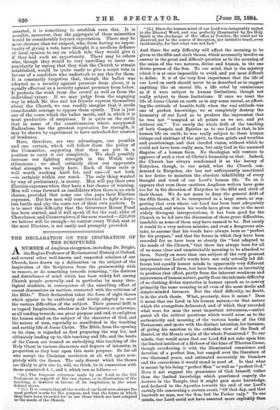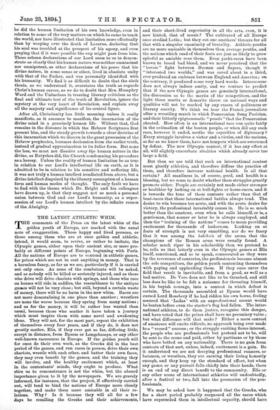THE DECLARATION ON THE INSPIRATION OF THE SCRIPT U RES.
ANUMBER of Anglican clergymen, including Dr. Bright, the Regina Professor of Ecclesiastical History at Oxford, and several other well-known and respected scholars of our Church, have drawn up a declaration on the subject of the inspiration of the Scriptures from the praiseworthy wish to remove, or do something towards removing, "the distress and disturbance of mind which has been widely felt among Church people generally, and in particular by many theo- logical students, in consequence of the unsettling effect of recent discussions on matters connected with the criticism of the Bible." Their declaration takes the form of eight theses which appear to be cautiously and wisely adapted to meet the various difficulties of the subject. Their general drift is to regard Inspiration, whether in the Scriptures or otherwise, as all tending towards one great purpose and end, to enlighten the human mind on the subject of the character of God, and the nature of man, especially as manifested in the teaching and earthly life of Jesus Christ. The Bible, from the opening to its close, is regarded as first preparing the way for, and ultimately leading up to, this teaching and life, and the books of the Canon are treated as embodying this teaching of the Holy Ghost in various characters and degrees of intensity, in proportion as they bear upon this main purpose. So far all who accept the Christian revelation at all will agree com- pletely with the theses. The only dissent which the theses are likely to give rise to, will, we think, be in connection with those numbered 4, 5, and 6, which run as follows :—
" (4.) The frequent reference made by our Lord to the Old Testament in support of His own claims, or in illustration of His teaching, is decisive in favour of its inspiration in the sense defined above.
" (5.) It is certain that all the words of our Lord were always the most perfect words for His purpose, and that the forms in which they have been recorded for us are those which are best adapted to the 'needs of the Church.
"(6.) Since the human mind of our Lord was inseparably united to the Eternal Word, and was perfectly illuminated by the Holy Spirit in the discharge of His office as Teacher, He could not be deceived, nor be the source of deception, nor intend to teach, even incidentally, for fact what was not fact."
And there the only difficulty will affect the meaning to be given to the fifth and sixth theses, which necessarily involve an answer to the great and difficult question as to the meaning of the union of the two natures, divine and human, in the one divine person of the Son. To our mind, that is the mystery which it is at once impossible to avoid, and yet most difficult to define. It is of the very first importance that the life of our Lord on earth should never be so described as to suggest anything like an unreal life, a life acted by omniscience as if it were subject to human limitations, though not really subject to those limitations. If once we treat the life of Jesus Christ on earth as in any sense unreal, as affect- ing the attitude of humble faith when the real attitude was one of perfect knowledge, we so completely destroy the humanity of our Lord as to produce the impression that he was not "tempted at all points as we are, and yet without sin." Yet surely the whole drift of the teaching of both Gospels and Epistles as to our Lord is that, in his human life on earth, he was really subject to those human risings and sinkings of the spirit, to those griefs and troubles and questionings, and that clouded -vision, without which he could not have been really man, but only God in the assumed disguise of a human form. No theologian will venture to approve of such a view of Christ's humanity as that. Indeed, the Church has always condemned it as the heresy of Eutyches, though, to our mind, what the Church con- demned in Eutyches, she has not unfrequently sanctioned in her desire to maintain the absolute infallibility of every thought and word of our Lord's human life. To us it appears that even these cautions Anglican writers have gone too far in the direction of Eutyches in the fifth and sixth of their theses. We do not mean to deny the general drift of the fifth thesis, if it be interpreted in a large sense, as sug- gesting that even where our Lord has been least adequately understood, and where his words have given rise to the most widely divergent interpretations, it has been good lor the Church to be led into the discussion of these great difficulties, insoluble as some of them may have seemed to be. But surely it would be a very serious mistake, and even a dangerous mis- take, to assume that his words have always been so "perfect for his purpose," and that the forms in which they have been recorded for us have been so clearly the "best adapted to the needs of the Church," that there has always been for all of us some clear and unmistakable meaning to be attached to them. Surely on more than one subject of the very greatest importance our Lord's words have not only actually led dif- ferent but equally honest minds to apparently very different interpretations of them, but have been so chosen as inevitably to produce that effect, partly from the inherent weakness and narrowness of human nature, partly from the intrinsic difficulty of so clothing divine mysteries in human speech as to convey primarily the same meaning to all even of the most docile and simple-minded listeners. But the chief difficulty, no doubt, is in the sixth thesis. What, precisely, does it mean P Does it mean that our Lord in his human nature,—in that nature which the evangelists delineated, and of which they recorded what were for man the most important utterances,—antici- pated all the critical questions which would arise as to the authenticity and meaning of the various books of the Old Testament, and spoke with the distinct intention, for instance, of giving his sanction to the orthodox view of the Book of Daniel, or the Mosaic origin of the whole Pentateuch P To our minds, that would mean that our Lord aid not take upon him the limited intellect of a Hebrew of the time of Tiberius Cmsar, though overflowing it with the illuminated conscience and devotion of a perfect Son, but ranged over the literature of two thousand years, and estimated accurately its blunders and the corrections it would stand in need of. Is that what is meant by his being "perfect Man" as well as "perfect God." Does it not suggest the prescience of God himself, rather than the limited knowledge which questioned eagerly the doctors in the Temple, that it might gain more knowledge, and declared to the Apostles towards the end of our Lord's earthly life concerning a certain event, "Of that day, and that knoweth no man, nor the Son, but the Father only." To our minds, our Lord could not have asserted more explicitly than
he did the human limitation of his own knowledge, even in relation to some of the very matters on which he caMe to teach the world, nor have illustrated that limitation more effectually than by weeping over the death of Lazarus, declaring that his soul was troubled at the prospect of his agony, and even praying that if it were possible the cup might pass from him. These solemn declarations of our Lord seem to us to demon- strate as clearly that his human nature was neither omniscient nor omnipotent, as other declarations of his prove that his divine nature, in some sense or other, lived in absolute unity with that of the Father, and was personally identified with his humanity. We find it as difficult to doubt that the sixth thesis, as we understand it, overstates the truth as regards Christ's human career, as we do to doubt that Mrs. Humphry Ward and the Unitarians in treating literary criticism as the final and ultimate test of the truth of Revelation, ignore the mystery at the very heart of Revelation, and explain away all the majesty and significance of its central figure.
After all, Christianity has little meaning unless it really manifests, as it assumes to manifest, the incarnation of the divine mind in a genuinely human life. Without that, God remains in the distance in which the Hebrew Scriptures first present him, and the steady growth towards a clear doctrine of this incarnation which we discern in the great procession of the Hebrew prophecies, becomes declension from the earlier truth, instead of gradual approximation to its fuller form. But none the less, we must not dissolve away the human nature in the divine, as Eutyches did, the Church condemning his procedure as a heresy. Unless the reality of human limitation be as true in relation to our Lord's intellectual life on earth, as it is admitted to be in relation to his sensitive and suffering life, it was not truly a human intellect irradiated from above, but a divine intellect disguised by the illusory assumption of a human form and human modes of thought. The only fault we have to find with the theses which Dr. Bright and his colleagues have drawn up, is that they suggest not so much a personal union between God and our Lord's humanity, as a super- session of our Lord's human intellect by the infinite reason of the Almighty.



































 Previous page
Previous page